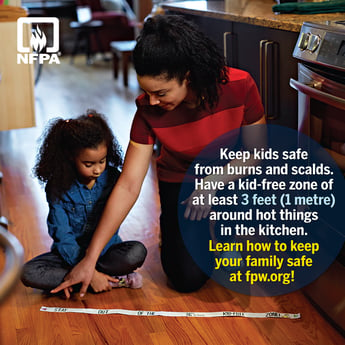 Last week was National Fire Prevention Week but reducing the risk of fires at home and at work is something we should all think about year around. Why is fire prevention important?
Last week was National Fire Prevention Week but reducing the risk of fires at home and at work is something we should all think about year around. Why is fire prevention important?
There are so many reasons, and they go beyond loss of life and property, although those two are of course top of mind when you think about a fire. It’s about your family, the home you’ve built, your peace of mind and more. We are privileged to live in a time where fires are much less common. But to keep it that way, we have to keep in mind the simple actions we can take to make our homes, families, businesses, and colleagues safer.
We’ve broken down the top five things that fire prevention and safety planning help you protect, along with simple actions you can take to reduce your risk.
1. Protect your people.
Above all else, fire and life safety measures matter because it’s all about protecting your people – your family, friends and coworkers. Simple measures can cut the risk of loss of life in a fire in half, such as having working smoke detectors in a home, properly installed throughout the house.
What are some other measures you can take to protect your people? Check out the list below:
- Come up with a plan for what to do in case of a home fire.
- As a family, go room to room and establish two ways out of each room that can be used if there’s a fire. Make sure children know how to get out on their own in case you can’t help them.
- Install smoke alarms in every sleeping room, outside each separate sleeping area and on every level of the home – including the basement. Make sure to test smoke alarms at least once a month.
- Make sure everyone knows the sound of the smoke alarm and how to respond if it goes off.
- Establish a person who will help any children, older adults, and people with disabilities wake up and get out if there’s a fire.
- Establish a meeting place outside of the home, where everyone will meet up if there’s a fire.
- Practice fire drills where you use different ways to get out, closing doors behind you as you leave to help stop the fire from spreading.
- Remember never to go back for people, pets or things – call 9-1-1 and let the emergency personnel go in after them.
2. Protect your home.
For many, the idea of losing their home in a fire is unimaginable. It’s not just losing where you live – it’s losing all of the memories inside of it, such as home videos, photographs, heirloom jewelry or furniture and other possessions. It’s losing all of the things that you’ve carried with you throughout your life.
In a study from the National Fire Protection Association (NFPA), 27% of reported fires occurred in homes – and four out of every five fire deaths and three-quarters of all fire-related injuries were caused by home fires. On average, fire departments respond to about 354,400 home fires every year, most caused by cooking or heating.
Don’t become a part of the statistics. Protect your home with fire alarms, and always practice safety when cooking in particular.
Some easy best practices to follow while cooking are:
- Stay in the kitchen when frying, boiling, grilling or broiling any food.
- If you’re simmering food, baking or roasting something, check on it regularly and don’t leave your house.
- Always keep a lid nearby when you’re cooking, and if a small grease fire starts, slide the lid over the pan and turn off the burner. Leave the pan covered until it’s cool to the touch.
- Keep flammable items away from the stovetop.
- Be aware of loose clothing, which can catch fire on burners. Wear close-fitting or tightly-rolled sleeves when cooking.
- Maintain a kid-free zone of at least 3 feet around the stove and areas where hot food or drink is being prepared.
When it comes to heating, it’s also simple. Keep anything that can burn at least 3 feet away from any heating equipment, have a kid-free zone of 3 feet around open fires and space heaters, and maintain heating equipment and chimneys by having them cleaned and inspected by a professional at least once a year.
3. Protect your business.
Home fires may be more common, but business and office fires happen too, impacting workers and costing business owners time and money.
According to NFPA, United States fire departments respond to an average of about 3,340 office fires each year – resulting in about $112 million in direct property damage. More than one in four office fires was caused by cooking fires – but these fires accounted for just 6% of the direct property damage. Electrical distribution and lighting equipment are the second leading cause of fires, causing 15% of the property damage.
All of that’s pretty scary. But, when present, wet pipe sprinklers operated 90% of the time in fires large enough to active the equipment – and they were effective in 88% of those fires. Deaths were also 62% lower when offices had sprinklers, compared to properties with no automatic extinguishing equipment.
Of course, all businesses want to be compliant when it comes to fire code and regulations, but we want you to think beyond compliance. We want you to think about protecting your people and property in the most effective way possible.
What precautions and preventative measures should a business take? It’s depends on your business and particular needs, but at CertaSite, we recommend these life safety systems:
- Fire Alarm
- Fire Extinguishers
- Fire Sprinkler
- Fire Suppression
- Kitchen Fire Suppression
- Emergency & Exit Lighting
- Back flow Devices
- Fire Pumps
- System Monitoring
- First Aid
- Security
4. Protect your time
When you experience a house fire everything changes in an instant, and your life and routine is thrown into a freefall.
The fire restoration process is a long one, and includes assessment, damage control, cleaning, repairs, replacing damaged items, and sometimes rebuilding a home or office altogether. The process can take weeks to months, depending on the scale of the fire.
Fire prevention may seem time-intensive – between the planning, practicing, and acquiring equipment – but it’s nothing compared to the time of recovering from a fire. A few simple steps now can save you months of time later.
5. Protect your peace of mind.
Last but certainly not least, fire and life safety is important to protect your peace of mind – your sanity.
No one wants to think about a fire, but they happen more often than you’d think, and so many are preventable. Simple measures like smoke detectors, cooking precautions, fire extinguishers, and sprinklers in offices can go a long way in stopping fires if they happen and preventing them in the first place.
With confidence that you’re prepared should a fire happen, you’ll be ready if it does. That peace of mind is priceless.




